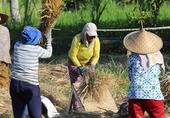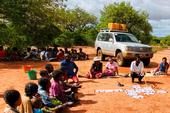SAND Research group: Sustainable Food and Nutrition Security
Challenges and issues
One of today’s major challenges is to achieve food and nutrition security, everywhere and for everyone (ODD2), by relying on sustainable food systems, i.e. systems capable of meeting nutritional and health requirements by integrating the environmental, socio-economic and socio-cultural impacts of diet. In this context, the SAND group’s scientific work is guided by two objectives:
- Identifying and understanding the factors, both individual and those linked to the social, economic, physical and political environment, that influence food consumption and nutritional status of populations, especially of the most vulnerable populations.
- Analysing the impacts of transitioning diets on food and nutrition security (FNS) and on health.
Scientific issues
These interdisciplinary issues are explored through three research axes that not only provide information on current trends of change, but also identify the obstacles to healthy and sustainable transitions and the levers for action.
Axis 1 - Food and Nutrition Transitions
What are the determinants and effects of nutrition and food transitions?
We work on characterising nutrition transition dynamics, their current stage, and their specificities in various contexts. Based on empirical studies, we also examine the relevance and applicability of the classic model of nutrition transition described in the literature. We are interested in the effects of global and societal changes, and the individual and social factors that generate or catalyse changes in lifestyles, as well as the consequences for health and the groups in society most vulnerable to nutritional risk, depending on the context.
Axis 2 - Food Environment
What is the relationship between the urban food environment and the sustainability of dietary behaviours?
We address the food environment from several angles: physical, social and political. We assess the relative influence of the real/measured and perceived food environment on dietary behaviours compared to individual factors in order to identify environments that favour the adoption of more sustainable dietary habits by urban populations.
Axis 3 - Agriculture-Food Nexus
How do agricultural strategies interact with household food provisioning strategies?
We conduct our research at two different scales: (i) micro-economic, where the aim is to study household food provisioning strategies and their contribution to meeting nutritional needs. In particular, we study the determinants of production decisions, the use of natural biodiversity and reliance on markets of agricultural households; and (ii) meso- and macro-economic, where the aim is to specify the quantities and quality of agri-food supply necessary to ensure the food and nutritional security of populations at territorial levels (countries, regions).
Transversal Axis - Intervention Research
How can we design, implement and evaluate nutritional interventions and policies to make them relevant, appropriate, effective and sustainable?
One of our original approaches is intervention research, or "solutions science", which aims to produce knowledge for informing decision-making and action. This research not only helps to design interventions, programmes, and policies, but also to evaluate them (impact, implementation, mechanisms of action, scaling-up, etc.) in order to orient decisions in favour of effective, sustainable measures.
Fields of expertise
Our work is based on observational studies, intervention studies and modelling. The team uses quantitative approaches based on the use of databases generated from ad-hoc surveys and/or the combining of existing heterogeneous databases. These approaches are based on biostatistics, econometrics and mathematical programming, and are combined with qualitative, often participatory, approaches.
Main geographical areas
- Sub-Saharan Africa
- Southeast Asia
- Europe
- Madagascar
- French overseas regions
- Mediterranean zone
Joint scientific report: Food and nutrition in French overseas regions
This joint report from IRD, coordinated by SAND researchers Caroline Méjean and with the participation of Marie-Josèphe Amiot-Carlin and Yves Martin-Prével, was commissioned by the Ministry of Health (DGS), and provides an overview and recommendations on the nutritional status of populations in French overseas regions, focusing on food and nutrition in Guadeloupe, French Guyana, Martinique, Mayotte and La Réunion.
Download the full report




